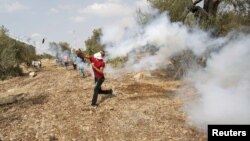Israel has sent hundreds of troop reinforcements to the West Bank after Palestinian gunmen killed a Jewish couple in a drive-by shooting. Military sources say the assailants drove up alongside the Israeli vehicle and riddled it with bullets. The couple’s four children, ages 9, 7, 4 and four months, watched their parents die but escaped unharmed.
Such shootings were common during the Second Palestinian Intifada, or uprising, from 2000-2004, but in recent years they have been relatively rare.
“There was very, very massive fire ...such as we haven’t seen here for a long time,” said Eli Bin, the director of Israel’s Magen David Adom [Red Star of David] rescue service. “We had no choice but to pronounce them dead at the scene.”
Shooting victims
The victims were identified as Eitam and Naama Henkin, both in their 30s. They were residents of the Jewish settlement of Neria in the West Bank.
The attack comes amid simmering unrest surrounding the Mosque of Al-Aqsa in Jerusalem’s Old City, known to Jews as the Temple Mount. The mosque and golden Dome of the Rock are revered by Muslims as the place where the Prophet Muhammad ascended into heaven and mark the third holiest site in Islam. For Jews it is the location of the two biblical temples and the holiest place of all.
The Al-Aqsa compound is a flashpoint of the Israeli-Palestinian conflict and violence has spiked there since the Jewish High Holy Days began nearly three weeks ago. On several occasions, masked Palestinian youths barricaded themselves inside the mosque, throwing rocks, firecrackers and Molotov cocktails at Israeli police.
Unrest
Tensions have flared over Jewish visits to the holy site which are permitted under a “status-quo agreement” in which Muslims administer the compound while Israel is responsible for security. But rumors are swirling among Palestinians that the Jews plan to seize control of Al-Aqsa in order to rebuild the Third Temple — something Israel adamantly denies.
The unrest at the mosque has sparked sporadic stone-throwing clashes in the West Bank between Palestinians and Israeli security forces. On the eve of Rosh Hashanah, the Jewish New Year, an Israeli died in Jerusalem when his car was hit by stones and crashed.
The Palestinian Authority, Jordan and Saudi Arabia blame Israel for the violence at the Al-Aqsa Mosque and have demanded that police stop attacking Muslim worshippers there. But Israeli Prime Minister Benjamin Netanyahu blames the unrest — and the latest drive-by shooting — on the Palestinian Authority.
“It has been proven again that wild Palestinian incitement leads to acts of terrorism and murder such as [this],” Netanyahu said. “We are witness to an especially heinous and shocking murder in which parents were murdered, leaving four young orphans.”
There was no claim of responsibility for the attack, but the Islamic militant group Hamas that rules the Gaza Strip welcomed it. “We praise the heroic operation that fighters in the West Bank carried out and we consider it a true response to the occupier’s crimes,” the Hamas military wing said. It called for more attacks.
The more moderate Palestinian Authority, which controls Arab cities in the West Bank, did not immediately comment on the shooting. But in a fiery speech at the U.N. General Assembly on Wednesday, Palestinian President Mahmoud Abbas said violence is a consequence of Israeli policies.
“I call on the Israeli government, before it is too late, to cease its use of brutal force to impose its plans to undermine the Islamic and Christian holy places in Jerusalem, particularly its actions at the Al-Aqsa Mosque,” Abbas said. “Such actions will convert the conflict from a political to a religious one, creating an explosive situation in Jerusalem and in the rest of the occupied Palestinian territories.”
Israeli Defense Minister Moshe Ya’alon visited the site of the shooting and vowed to bring the perpetrators to justice. “We have deployed large forces in the area ...to track down the murderers,” he said. “I hope that we will arrest them sooner rather than later.”
Israel has sent four additional battalions to the West Bank to search for the killers and prevent revenge attacks by militant Jewish settlers. Shortly after the shooting, a Palestinian car was torched, others were stoned and graffiti promising revenge was scrawled on an Arab house.
Settlement construction to continue
In July, suspected Jewish militants torched a Palestinian home, killing an 18-month-old toddler and his parents. The incident sparked a wave of Palestinian protests, and Israel fears that another deadly attack by Jewish extremists could ignite a third Palestinian uprising.
Another source of perpetual friction is Israel’s expansion of Jewish settlements in the West Bank. This has stoked Palestinian anger and brought international condemnation, but any attack on settlers tends to make Israel more resolute.
President Reuven Rivlin told thousands of mourners at the funeral for the slain couple that settlement construction will continue. “We didn’t build because of terror,” he said, “and we won’t stop building because of it.”




